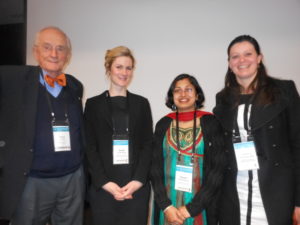

2014 Young Scholar: Soumi Paul Mukhopadhyay

Soumi Paul Mukhopadhyay
Charles Sturt University
Sponsored by the ACT Committee
Soumi Paul Mukhopadhyay (from India) is a food technologist by profession and is currently pursuing her Doctorate of Science at Charles Sturt University, Wagga Wagga. Her areas of interest include sensory sciences, technology R&D, process improvement and regulatory compliance; areas in which she has had hands-on experience while working for five years with global giants like Nestle and Whirlpool. Before commencing her PhD at CSU, she worked as a Food Scientist for the Asia Pacific region with Whirlpool Corporation. Her present research topic deals with eliciting sensory characterisation and consumer preferences for Australian desi chickpeas. This conference is an opportunity for Soumi to hear about recent developments in the food security field and understand ways she can contribute to society after she finishes her research. Attending this conference will also help her decide her future career direction and network with scholars and students from my discipline.
Conference report
I believe the immense value of attending this conference lies in the networking opportunities …”
2014 is especially significant to me as I have received prestigious Crawford Fund Travel Scholarship to attend the 2014 Crawford Fund Annual Parliamentary Conference at Parliament House Canberra. The 2014 conference was titled “Ethics, Efficiency and Food Security: Feeding The 9 Billion, Well”.
Attending the Crawford Fund Parliamentary Conference gave me the opportunity not only to meet renowned scientists and dignitaries from around the world; but also provided me the opportunity to listen to the world’s best speakers, ask relevant questions in the extended Q&A session and opportunities for informal exchanges. This year’s conference was a huge success, attracting world renowned dignitaries, scientists, eminent agricultural researchers, scholars and students from various universities, research institutes and NGOs from Australia and around the world. This conference enabled participants from both industry and academia to discuss, contribute and highlight the issues into a context relevant and useful to the broader community and the key theme of “global food security”.
The conference was specifically centred on finding sustainable solutions to provide nutritious food to the 9 billion people expected to inhabit the world by 2050. I attended the “Sir John Crawford Memorial Address” which was ably presented by Professor Catherine Bertini, Senior Fellow, Global Agricultural Development Initiative, the Chicago Council on Global Affairs. She emphasized the importance of investing in women as one of the core pillars in the agricultural workforce around the world. I echoed with her points, as being a woman, I personally believe that women have a great potential to not only improve agricultural productivity but also alter the attitudes of family members within the homes of growing populations.
I believe the immense value of attending this conference lies in the networking opportunities as the conference dinner provided a really good platform to meet and greet the peers and researchers from different fields and gave them a wider understanding about the pressing issues that modern agriculture is facing nowadays. I came across several PhD students who are involved in research which has direct benefit to the common population’s well-being.
The last day of the conference was especially tailored to young agricultural scholars like me, who shared their experiences of international exposure by visiting several developing countries as part of their coursework or volunteering. The Scholars’ day was very encouraging for me, as several of the PhD students and “RAID” volunteers contributed to the discussion regarding the seemingly vast opportunities that agricultural science can offer to promote international development for ensuring global food security.